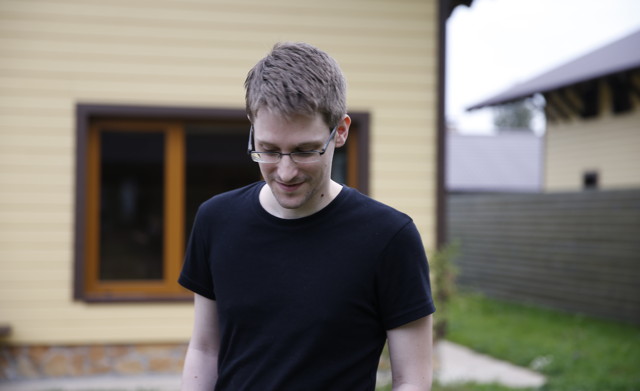If it’s the story at the heart of Citizenfour that gives the documentary its breathtaking urgency, it’s the film’s multilayered nature that makes a powerful statement on the modern relationship between a government and its citizens. Both a stunningly intimate character study and a larger, more global overview of governmental surveillance, Citizenfour reconciles the contrasting approaches to present an enlightening and emotionally-wrenching view of post-9/11 life.
The character at the heart of her study is former NSA employee Edward J. Snowden, who leaked classified information about the agency’s nasty habit of spying on civilians without warrants. Using the name that gives the film its title, he got in touch with Poitras in January 2013. That May, he flew to Hong Kong with the intention of disclosing what he knew, and Citizenfour director Laura Poitras and reporter Glenn Greenwald met him there in June in order to receive the information and present it to the world.
Much of the film concerns Poitras’ and Greenwald’s interactions with Snowden in the hotel room as they prepare to share the knowledge of the NSA’s iniquities. Along the way, we see the impending external pressure from media and government alike, as well as Snowden’s surprisingly stoic reactions to the threats. Even when he hears news of his partner being questioned as government officials search their home, he remains remarkably unfazed. He’s obviously concerned, but he appears to have been prepared for what was coming—he simply cares too much about sharing what he knows to let it stop him.
Citizenfour is a gripping, John Le Carré-like thriller in disguise as a documentary, and the film makes for compelling viewing, even if stripped of its larger political context. Even though we know the ending going into the film, Poitras’s intimate use of close-ups and a hand-held camera makes it captivating in a way that’s well-suited to her story’s gravitas. Though Snowden doesn’t get much in the way of character exposition—Poitras focuses heavily on his actions themselves—the few details we do see are more than enough to depict him as a strong-willed dissident. Poitras effectively conveys Snowden’s intense belief in his duty as a citizen and his desire to make the world a better place through his actions.
But she’s also not content to have her film be merely a hagiographical portrait. She frames the Snowden segments with footage of the former NSA intelligence official William Binney, who became a whistleblower shortly after 9/11 due to his disgust with the agency’s data collection policies. He shares scathing details about his former employer, as well as his frustration with the organization. Likewise, the prominent hacker Jacob Applebaum is also introduced, lecturing to potential NSA targets about the dangers they face. These segments simultaneously serve to confirm Snowden’s information and paint a more detailed picture of the shadowy, intricate web of governmental spying.
As Citizenfour emphasizes, all North American citizens and many foreigners are at high risk for being targeted by that web, which is only part of why the film makes for such essential viewing. Despite the importance of its message, it hardly feels like homework—the tale at its core is as gripping as any Hollywood thriller in recent memory. The horrifying information revealed on-screen makes you want to avert your eyes in disgust, but the power of Poitras’s filmmaking keeps you hooked. Citizenfour is a deeply political and angry film, but also one that doesn’t let its opinions detract from the strength of its art.
Citizenfour will be shown in Montreal starting Friday, Nov. 14 at Montreal Forum (2313 Saint-Catherine) and Montreal ExCentris (3536 Saint-Laurent). General admission is $12.99.









